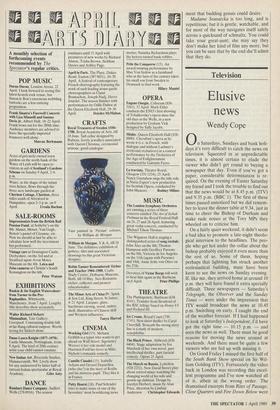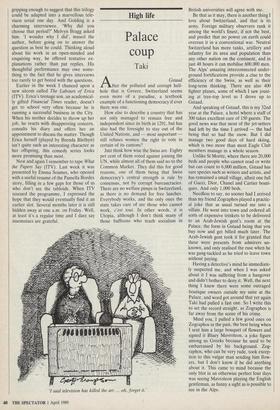Television
Elusive news
Wendy Cope
On Saturdays, Sundays and bank holi- days it's very difficult to catch the news on television. Squeezed in at unpredictable times, it is almost certain to elude the viewer who didn't get round to buying a newspaper that day. Even if you've got a paper, considerable determination is re- quired. On the evening of Easter Saturday my friend and I took the trouble to find out that the news would be at 8.45 p.m. (ITV) and 9.35 p.m. (BBC 1). The first of these times passed unnoticed but we did remem- ber to leave the dinner table at 9.34, just in time to cheer the Bishop of Durham and make rude noises at the Tory MPs they wheeled on to criticise him.
On a fairly quiet weekend, it didn't seem a bad idea to promote a late-night theolo- gical interview to the headlines. The peo- ple who get hot under the collar about the bishop probably enjoyed it even more than the rest of us. Some of them, hoping perhaps that lightning has struck another ecclesiastical building, must have been keen to see the news on Sunday evening. If, like me, they arrived home at around 10 p.m. they will have found it extra specially difficult. Three newspapers — Saturday's Telegraph, the Observer and the Sunday Times — were under the impression that ITV would broadcast the news at 10.45 p.m. Switching on early, I caught the end of the weather forecast. If I had happened to look at Saturday's Independent, I'd have got the right time — 10.15 p.m. — and seen the news as well. There must be good reasons for moving the news around at weekends. And there must be quite a few viewers who are fed up with missing it.
On Good Friday I missed the first half of the South Bank Show special on Sir Wil- liam Golding (ITV). Fortunately the video back in London was recording this excel- lent programme and I've now watched all of it, albeit in the wrong order. The dramatised excerpts from Rites of Passage, Close Quarters and Fire Down Below were gripping enough to suggest that this trilogy could be adapted into a marvellous tele- vison serial one day. And Golding is a charming interviewee. 'Why did you choose that period?' Melvyn Bragg asked him. 'I wonder why I did', mused the author, before going on to answer the question as best he could. Thinking aloud about his work in an open-minded and enquiring way, he offered tentative ex- planations rather than pat replies. His thoughtful performance may owe some- thing to the fact that he gives interviews too rarely to get bored with the questions.
Earlier in the week I chanced upon a new sitcom called The Labours of Erica (ITV). Erica's teenage son, an academical- ly gifted Financial Times reader, doesn't get to school very often because he is running a successful business in the City. When his mother decides to throw up her job, he reacts with disapproving concern, consults his diary and offers her an appointment to discuss the matter. Though Erica herself (played by Brenda Blethyn) isn't quite such an interesting character as her offspring, this comedy series looks more promising than most.
Now and again I remember to tape What the Papers Say (ITV). Last week it was presented by Emma Soames, who opened with a useful resume of the Pamella Bordes story, filling in a few gaps for those of us who don't see the tabloids. When ITV rescued the programme, I expressed the hope that they would eventually find it an earlier slot. Several months later it is still hidden away at one a.m. on Friday. Well, at least it's a regular time and I dare say insomniacs are grateful.



















































 Previous page
Previous page